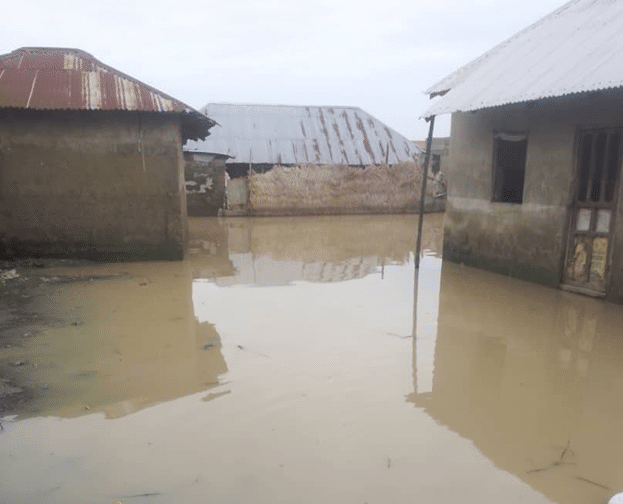Yunusa Umar
When the Federal Government sounded the alarm about impending floods, it was intended as a wake-up call. Yet across several states, weak preparedness and poor infrastructure have left communities dangerously exposed, setting the stage for another season of destruction and displacement.
In September, the Federal Government of Nigeria issued a warning of heavy flooding in 32 locations across 11 states, according to the National Flood Early Warning Centre under the Federal Ministry of Environment.
The alert listed vulnerable areas as follows: Adamawa State (Ganye, Natubi); Benue State (Abinsi, Agyo, Gogo, Ito, Makurdi, Udoma, Ukpiam); Nasarawa State (Agima, Rukubi, Odogbo); Taraba State (Beli, Serti, Donga); Delta State (Umugboma, Umukwata, Abraka, Aboh, Okpo-Krika); and Niger State (Rijau).
Other at-risk locations include Kebbi State (Ribah); Kano State (Gwarzo, Karaye); Katsina State (Jibia); Sokoto State (Makira); and Zamfara State (Kaura Namoda, Shinkafi, Maradun, Gusau, Anka, Bungudu).
The ministry further cautioned that rising water levels in the River Gongola, River Benue, and River Niger pose additional risks. Communities located along the floodplains of these rivers were specifically warned.
“Due to a rise in the water level of River Gongola, River Benue, and River Niger, communities on the floodplains of the River Gongola up to Numan, and also those on the floodplains of the River Benue and River Niger up to Lokoja, are advised to evacuate immediately,” the ministry stated.
Officials stressed that flooding remains one of Nigeria’s most devastating natural disasters, with climate change accelerating both its frequency and severity. They urged states, local governments, and residents in flood-prone areas to take precautionary measures and strengthen their preparedness to minimise the loss of lives and property.
Resident reactions from predicted flood areas
For many Nigerians living along the floodplains of the Niger and Benue rivers, the government’s latest flood warnings are nothing new. Instead, they serve as a grim reminder of a disaster that has become routine.
Abubakar Yahaya, a 38-year-old farmer from Ketso village in Mokwa, Niger State, told New Daily Prime that his community has endured repeated devastation for as long as he can remember.
“Since my childhood, our homes have been destroyed again and again whenever torrential rains fall or dams release excess water,” he said. “We rebuild every year, but the floods always come back.”
He added that the floods are steadily reducing soil fertility, making it harder to grow crops, while stagnant water brings outbreaks of malaria, cholera, and typhoid. “Life here gets harder each year,” Yahaya said.

Mohammed Danlami Usman, a 30-year-old who has farmed along the banks of the River Niger in Patigi for years, has repeatedly watched his crops being washed away season after season. He acknowledged that residents are aware of the risks but blamed both local authorities and the community itself for failing to prepare adequately.
Across affected states, the story is much the same: farmland lost, homes destroyed, families displaced. Each flood season deepens poverty, drives financial hardship, and undermines Nigeria’s food security.
What was once seen as an occasional natural disaster has now become an annual ordeal, leaving rural communities trapped between rebuilding and bracing for the next inevitable flood.
“We need the government’s help to reduce the impact of these floods before they destroy everything we have,” Usman pleaded. “Without support, our community cannot survive another season like this.”
He went on to appeal for urgent assistance: “We are asking the government to provide shelters and a safe environment, because proper resettlement will help us protect our families and our livelihoods,” Usman said, his voice breaking with emotion.
Flooding: Expert proffers roadmap for prevention
Mr Philip Jakpor, a climate change expert and Executive Director of the Renevlyn Development Initiative (RDI), a non-governmental organisation, told New Daily Prime that flood-prone communities in Nigeria lack the awareness needed to prepare for looming disasters.
“The communities are practically on their own, and this has become a recurring decimal. The most disturbing aspect is that states exploit the disasters caused by yearly floods to obtain Ecological Funds, which then grow wings and fly away,” he said, blaming both state and federal governments for poor preparation to address the crisis.
Jakpor also noted that government interventions reflect a disconnect from modern disaster management practices. “They lack helicopters or speedboats to rescue trapped communities. Unfortunately, the response of the National Emergency Management Agency (NEMA) and their state counterparts has largely centered on distributing rice whenever there’s a disaster. We always wonder why there’s this obsession with sharing rice as an emergency response strategy,” he added.
The expert explained that flood-prone communities can protect themselves through communal evacuation measures. He further advised residents to take advantage of early warning systems provided by the Nigeria Hydrological Services Agency and the Nigeria Meteorological Agency (NiMET), which forecast rainfall patterns and broadcast the information via radio and television.
He added that Nigerians should demand accountability, stressing the need for a probe into allocations for flood management, including Ecological Funds.
Jakpor told New Daily Prime: “Nigerians should also advocate that NEMA and its state counterparts scale up their work to go beyond rice distribution. We want to hear that NEMA has modern equipment and other intervention structures that can save lives. These are not too much to ask for, and they are not rocket science.”
Highlighting solutions, Jakpor stressed the need for the government to commence genuine sensitisation of locals in flood-prone areas. “The message should not be restricted to press briefings in Abuja that never trickle down to the identified communities,” he said.
“The local communities should be grouped to benefit from early warning systems, which have proven effective. The warnings should be delivered in concert with the National Orientation Agency (NOA), which has a nationwide presence. Local languages should be used, traditional institutions involved, and town criers deployed.”
He concluded by urging states to set up temporary shelters with proper facilities to ease the plight of displaced persons. “Ecological Funds should be deployed in extreme cases of flooding and displacement, and their disbursement and use should be strictly monitored,” Jakpor said.



